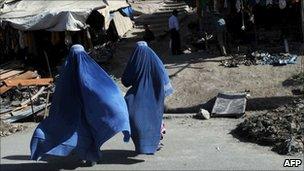The Liberation of Souls
The Taliban represent an outgrowth of Wahaabi Islam, a strict, fundamentalist view of Islam that the Kingdom of Saudi Arabia successfully proliferated through its funding of madrassas through its oil riches and its fierce dedication to their brand of unforgivingly-Islamist salafism. Other fundamentalist jihadi groups like the Muslim Brotherhood, Boko Haram, Hamas and al Shabaab also reflect Wahaabi Islamism.Just as in Saudi Arabia women may not venture into the public arena other than in the company of a male family member, and even then, fully veiled and body-concealed; may not drive a car; may not travel without a husband's or father's permission, may not vote, may not be in the presence of a male outside the family unit, and other massive indignities as fully mature independent-minded individuals, the women of Afghanistan had been forbidden to gather for celebrations or parties, work for a living, listen to music, dance, along with all the above-mentioned strictures imposed on them by a clearly misogynistic society.

Under the Taliban women could not be medically treated by a male physician. And nor were women permitted to have treatment in a hospital that catered to men; they had to have their own under-funded hospital. Moreover, the women who catered to them in the health professions had to themselves -- even surgeons conducting operations -- be fully burka-clad.
Under the post-Taliban Afghan government of Hamid Karzai, a demand by Shia Muslim Afghans that a law be promulgated whereby women's role would be defined in a marriage as "readiness for sex and not leaving the house without the husband's permission"; in effect the men would have "their sharia rights" under Islamic law, and women under that law would effectively be pawns of a society whose Medieval-era enslavement of women the former president enshrined into law.
There is now a new government and a new president, but women's rights in Afghanistan have not even begun to see the light of day. They remain subordinated to men, denied fundamental human rights. They cannot even be seen at a gravesite to grieve, let alone have the right to drive, vote or run for political office. But they can now vote. Even so, in 2011 Afghanistan was singled out by a study undertaken by the Thomson-Reuters Foundation as the worst place in the world for women in recognition of high violence levels, poor health care and poverty.
None of these constraints stops some Afghan women from excelling in professions which in the previous decades have been off limits to women. Even though however, lip service is paid by the government to women's rights, a crowd of men visiting the Shah-Do Shamshira mosque in downtown Kabul became a ravening mob out for blood in mid-March as they beat and stomped a student of Islam, Farkhunda, 28 years of age, to death on the basis of a rumour spread by a mosque cleric that she had burned a Koran. She was, in fact, a Koranic scholar, teaching Islam to other women.
 |
| Afghan women's rights activists carry the coffin of Farkhunda during her funeral in Kabul Photo: AP Photo/Massoud Hossain |
Women who are outstanding Afghan professionals from the fields of activism, journalism, sociology, theatre, photography, medicine, political science, gathered to implore Farkhunda's family to allow them the honour of bearing her simple wooden coffin to the cemetery where she was to be buried, and the family acceded to their request, a cultural, social anomaly. Amid mass protests at the horrible assault against the young women and the fact that not one man moved a finger to save her, and nor did Afghan police make an effort to extract her from the rampaging male mob, her coffin was carried in dignity and honour to her final resting place.
"I was just crying. It was a long trek and I injured myself but all my energy was focused on giving Farkhunda a respectable burial. It was the first time I realized my real power and told myself that I'm breaking the boundaries of tradition", said Yeayish, a medical student who along with other outraged women carried the coffin to the Pansad Family Cemetery in Kabul, stopping traffic as they snaked through the streets.
And then, a cleric appeared at the burial site at the cemetery, a man named Mohammad Ayaz Nianzi.
His statement had been recorded on video before the funeral in support of the attackers of the woman being buried. That any woman desecrating a Koran deserved to die. The woman who had managed the event, gathering others to lend themselves to honouring the dead young Koranic scholar shouted at him: "You are not allowed to do the janaza, the funeral prayer Leave!"
Labels: Afghanistan, Gender Inequality, Islam, Sexual Predation

0 Comments:
Post a Comment
<< Home